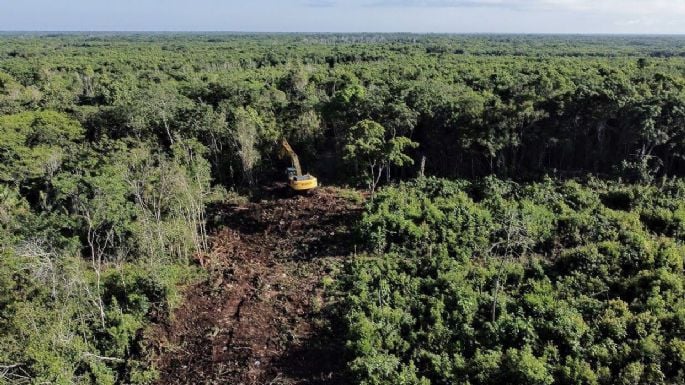Playa del Carmen, Q. Roo — Federal judges in Quintana Roo and Yucatán have refused to admit a new injunction request to stop the clearing of jungle for the construction of the Tren Maya cargo terminal in Cancún. The lawsuit was filed by the Mexican Center for Environmental Law (Cemda), which is now awaiting a decision from a higher court on its petition, filed last September, seeking to compel the Army, the entity in charge of the project, to comply with ecosystem protection measures for the already impacted area, or, alternatively, to halt the work entirely.
This situation arises because the vegetation removal and infrastructure construction work is being executed without authorization for a change of land use on forested terrain. This authorization must be paired with the environmental impact resolution approved last August.
Consequently, in September, Cemda sought an injunction against probable violations of the right to a healthy environment, stemming from the authorization granted by the Ministry of Environment and Natural Resources (Semarnat) to the Ministry of National Defense (Sedena), the project proponent for the "Cancún Multimodal Terminal" for the cargo modality.
Initially, Alonso Robles Cuétara, the Fifth District Judge of Quintana Roo—who did not participate in the judicial selection due to the lottery system promoted by Morena—declined to rule on the injunction request. He alleged that, based on a 2021 agreement, all lawsuits against the Tren Maya must be concentrated in the First District Court of Yucatán.
However, the latter court, headed by Judge Tania Gabriela González Rosas, also refused to accept Cemda's lawsuit. She argued that the terminal no longer forms part of the original Tren Maya project, which has been operating in this part of the country for months in its passenger modality.
Judge Tania Gabriela González Rosas served until last February as the director of the Institute of Patrimonial Legal Security of Yucatán, under the Morenista Joaquín Díaz Mena, governor of that state.
She was elected in the recent judicial election, but the National Electoral Institute (INE) determined to invalidate her victory as a District Judge because she did not meet the minimum average score of 8 established in the call for applications. However, this determination was later dismissed by the Superior Chamber of the Electoral Court of the Federal Judiciary.
González Rosas took the place of Adrián Novelo Pérez, who, while presiding over that court, had granted environmentalists suspensions against the Tren Maya works. According to some accounts within judicial circles, Novelo Pérez allegedly received pressure from Arturo Zaldívar, the former president of the Supreme Court of Justice of the Nation, to rule in favor of the federal project.
Incomplete Information
Miguel Solís, a lawyer for the southeastern office of Cemda, maintained that this new clearing of jungle, located next to the Tren Maya Cancún Airport station, is part of the original project erected during the term of former President Andrés Manuel López Obrador.
"The Multimodal Terminal," explains Solís, "definitively forms part of the Tren Maya megaproject, and perhaps for that reason it should fall to the First Court (Yucatán), but for us, what matters is that the argument we are making in our injunction is heard on its merits."
In the Environmental Impact Statement (MIA), as in the resolution, "they omit how the impacts will be once this terminal enters into operation, and another concern we have is the fact that the authority began the works without having the corresponding permit for change of forest land use," he adds.
Due to the positions of the two district courts, it will be the Third Collegiate Circuit Court of Quintana Roo that, after delays, resolves which federal court should take the case.
Proceso revealed last August that Semarnat authorized the clearing of jungle for the construction of the Tren Maya cargo terminal on a 261-hectare plot located on the outskirts of Cancún. According to the resolution published in the Gaceta Ecológica, the displacement of 12 species of at-risk fauna is anticipated.
Sedena was given an 18-month deadline for its construction, with a public investment of 7.76 billion pesos.
"The Cancún Multimodal Terminal will have 28 elements to provide the freight train service: a hazardous waste warehouse, lodging for the National Guard, lodging for crew members, a tetra antenna, a customs inspection facility, a scale, public right-of-way warehouses, a vehicle access booth, among others."
Semarnat clarified to the Tren Maya that it must still process the special permit for the installation of two diesel storage tanks with a capacity of 240,000 liters for locomotive consumption. This permit remains pending issuance by the Agency for Energy and Environmental Safety (ASEA), according to the resolution issued in favor of the project proponent.
Discover more from Riviera Maya News & Events
Subscribe to get the latest posts sent to your email.
